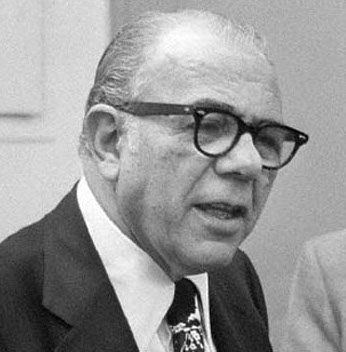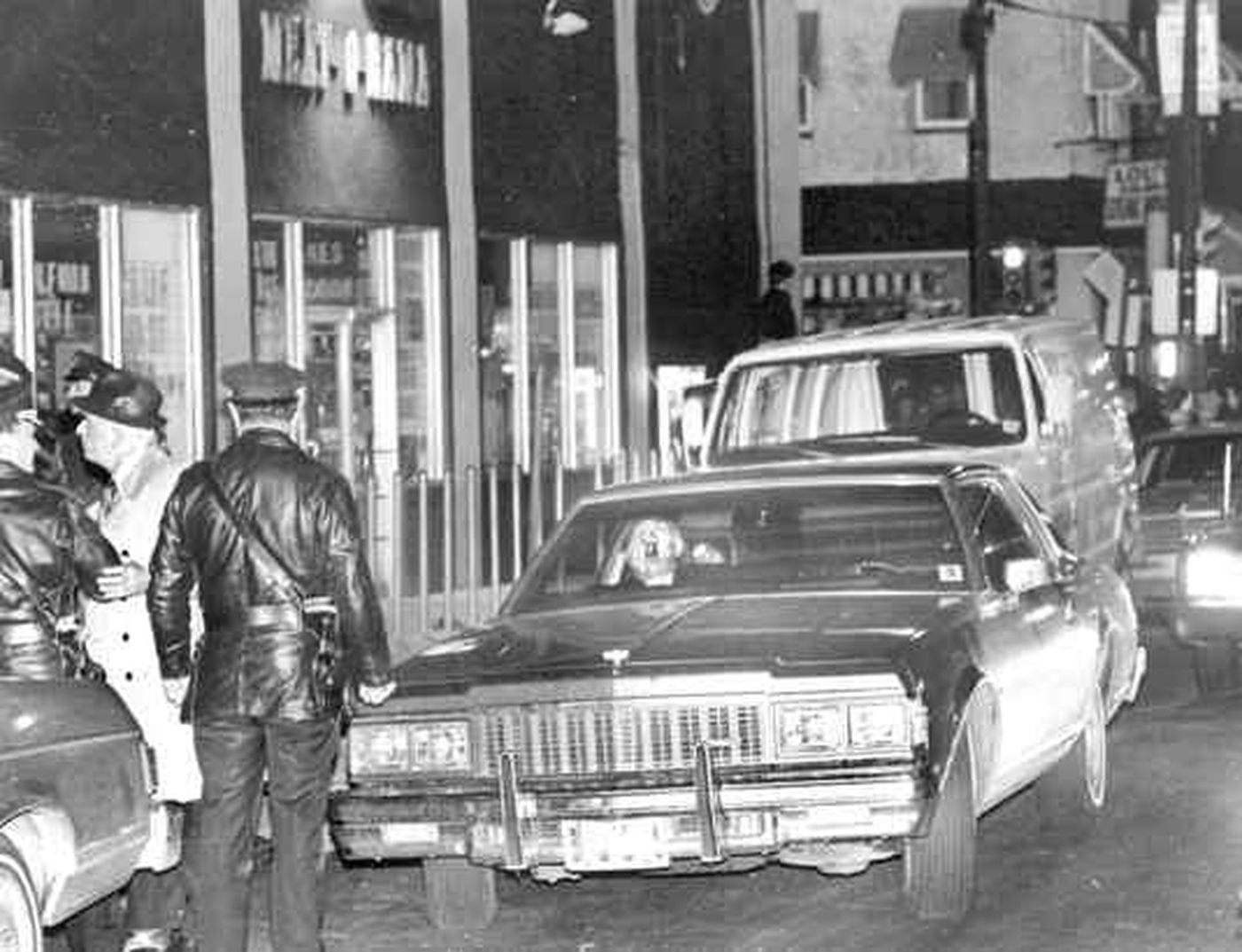
Bruno became a "made man" during his thirties.
Annaloro eventually adopted the surname "Bruno" as a nod to Philadelphia mobster Giuseppe "Joe Bruno" Dovi. Bruno married Sue Maranca, with whom he eventually had two children: Michael and Jean.
Bruno painted the windows of the family home on Broad Street black in order to protect his number-running business from surveillance.
Bruno later moved his family to a three-bedroom rowhouse on 934 Snyder Avenue -- the first home that he owned.
Bruno was named head of the Philadelphia family by 1959, replacing Antonio Pollina. Bruno oversaw the organization's participation in extortion, loan sharking and racketeering, which yielded significant profits.
In 1960, Bruno was reported to be one of nine men who comprised La Cosa Nostra's national commission.
In late 1963, Bruno was charged with conspiracy to travel across state lines to commit extortion following an October 31 indictment; his bail was set at $75,000 by U.S. Commissioner Francis H. Farrell.
In 1976, Atlantic City, New Jersey was on the verge of legalizing gambling in the city, prompting Bruno to exploit his ties to Pittsburgh steel corporations to involve himself in the construction of casinos -- and later, their operation -- in the burgeoning gaming destination.
Bruno earned the nickname "the Gentle Don" because of his rumored preference for resolving conflicts non-violently. Bruno even exiled one of his soldiers, Nicodemo "Little Nicky" Scarfo, to Atlantic City, New Jersey because he deemed him too violent. Bruno also adhered, at least officially, to the long-standing Cosa Nostra prohibition on narcotics sales.
Not one to shun the limelight, Bruno rubbed shoulders with celebrities such as Frank Sinatra, Joe DiMaggio and Vic Damone. DiMaggio even reportedly sold some of actress Marilyn Monroe's jewelry to the mobster after the couple divorced.
Bruno threw his daughter Jean an extravagant 16th birthday party at chic Philadelphia area nightclub the Latin Casino.
In 1971, Bruno was indicted by a federal grand jury and charged with conspiring to prepare a fraudulent tax return -- for 1965 -- for his wife, Sue. Mrs. Bruno was charged with knowingly submitting the alleged false return. However, after Bruno's co-defendants, Martin A. Coopersmith and Marvin J. Levin, were granted a separate trial and acquitted following the three-week proceedings, his conspiracy charge was dismissed.
However, following Bruno's refusal to testify before the New Jersey State Commission of Investigation, he was incarcerated at the New Jersey State Prison, located at Yardville, NJ.

In April 0f 1977, Bruno met with New York's Gambino crime family capo regime Paul Castellano at Cherry Hill, New Jersey's Valentino's Restaurant. According to investigators, the summit was convened at the Gambinos' request because of their interest in securing Bruno's approval to operate in Atlantic City, which was a part of his South Jersey turf for decades, and would soon be hosting legalized casino gambling. Subsequently, two Gambino family members met with Bruno at his home on April 10, Easter Sunday, at which an agreement between the two organizations was reached. In May, Bruno agreed to testify before the State Commission of Investigation, but ultimately failed to satisfy the panel's inquiries regarding organized crime in New Jersey. In June, New Jersey governor Brendan Byrne signed a bill allowing casino betting in the Garden State.
On Friday, March 21, 1980, Bruno had a meal of chicken Sicilian and rigatoni marinara at South Philadelphia restaurant Cous' Little Italy before heading home. He was killed by a single shotgun blast to the back of his head as he sat in the front passenger seat of a car parked in front of his South Philadelphia rowhouse, located at 934 Snyder Avenue. He remained seated upright with his mouth open in death. Bruno's driver, John Stanfa, sustained minor injuries from shotgun pellets. Bruno's murder is widely believed to have been retaliation from members of his own organization who resented his agreement to allow the Gambinos to conduct business within their territory. It would later be revealed that Philadelphia family consigliere Anthony "Tony Bananas" Caponigro put out a contract to murder Bruno.
Bruno's funeral was held on March 27. His copper-lined casket weighed 800 pounds. Bruno's death would bring an end to the longest tenure of anyone atop the Philadelphia family in the organization's history.
Caponigro was found murdered in April; his corpse was discovered in the trunk of a car in the South Bronx, New York. Approximately $300 in cash was found lodged in his mouth and rectum as a message -- a warning against greed. He'd been shot to death at his own home by mob enforcer Joe "Mad Dog" Sullivan because he'd failed to secure the Commission's (the Mob's ruling body) blessing to kill Bruno.
In February of 1981, a federal racketeering indictment naming Bruno the head of the Philadelphia crime family came down. Bruno wasn't charged because of his murder.
Though a May 27, 1981 Philadelphia Daily News article announced Bruno associate Frank "Frankie Flowers" D'Alfonso as the new boss in the wake of the former's murder, the report was incorrect and angered the actual new head of the family, Nicodemo Scarfo, who'd succeeded short-lived organization head, and former Bruno underboss Philip "the Chicken Man" Testa after his March 1981 murder. Scarfo consequently dispatched Eugene "Gino" Milano and Salvatore Testa to interrogate D'Alfonso, who was never inducted into the mafia, about his business dealings. When he refused to answer their questions, Testa and Milano beat D'Alfonso with a baseball bat and a pipe, leaving him for dead.
Though he survived the assault, D'Alfonso was shot to death in 1985, allegedly at Scarfo's behest. Nicholas Milano, Eugene Milano, Joseph Ligambi, Salvatore Merlino, Lawrence Merlino, Francis Iannarella, Thomas DelGiorno, Frank Narducci, Phillip Narducci and Scarfo were charged with first-degree murder, conspiracy to commit the murder and possession of an instrument of crime. Following a three-week trial, all but DelGiorno and Eugene Milano -- both of whom agreed to cooperate with the prosecution -- were convicted on all charges and given mandatory life sentences for the murder conviction. However, the convictions were reversed on appeal in 1992, largely due to prosecutorial misconduct.
Stanfa was named boss of the Philadelphia family in 1989.
On March 17, 2016, the Philadelphia Historical Commission rejected a petition to have Bruno's three-bedroom Snyder Avenue rowhouse designated one of the city's historical landmarks.


5 comments:
Very nice post. I simply stumbled upon your blog and wanted to say that
I've really enjoyed surfing around your weblog posts.
In any case I will be subscribing in your
rss feed and I'm hoping you write once more very soon!
This is very interesting, You are a very skilled blogger.
I have joined your feed and look forward to seeking more of your fantastic
post. Also, I have shared your website in my
social networks!
whoah this weblog is fantastic i really like studying your
posts. Keep up the good work! You realize, lots of persons
are looking round for this info, you can help them greatly.
Normally I don't read article on blogs, but I wish to say that this write-up very compelled me to try and do it!
Your writing style has been surprised me. Thanks, very great post.
This is my first time pay a visit at here and i am actually happy to
read everthing at one place.
Post a Comment